Related Research Articles

The National Assembly was the authoritative legislative body of the Republic of China, from 1947 to 2005. Along with the Control Yuan and the Legislative Yuan, the National Assembly formed the tricameral parliament of the Republic of China.
A constitutional amendment is a modification of the constitution of a polity, organization or other type of entity. Amendments are often interwoven into the relevant sections of an existing constitution, directly altering the text. Conversely, they can be appended to the constitution as supplemental additions, thus changing the frame of government without altering the existing text of the document.

A constituent assembly is a body assembled for the purpose of drafting or revising a constitution. Members of a constituent assembly may be elected by popular vote, drawn by sortition, appointed, or some combination of these methods. Assemblies are typically considered distinct from a regular legislature, although members of the legislature may compose a significant number or all of its members. As the fundamental document constituting a state, a constitution cannot normally be modified or amended by the state's normal legislative procedures in some jurisdictions; instead a constitutional convention or a constituent assembly, the rules for which are normally laid down in the constitution, must be set up. A constituent assembly is usually set up for its specific purpose, which it carries out in a relatively short time, after which the assembly is dissolved. A constituent assembly is a form of representative democracy.
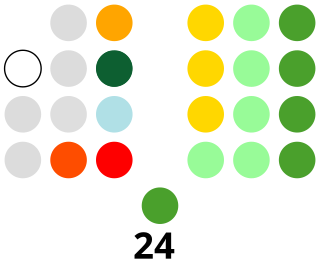
The Congress of the Philippines is the legislature of the national government of the Philippines. It is bicameral, composed of an upper body, the Senate, and a lower body, the House of Representatives, although colloquially, the term "Congress" commonly refers to just the latter. The Senate meets at the GSIS Building in Pasay, while the House of Representatives meets at the Batasang Pambansa in Quezon City, which also hosts joint sessions.
A supermajority is a requirement for a proposal to gain a specified level of support which is greater than the threshold of one-half used for a simple majority. Supermajority rules in a democracy can help to prevent a majority from eroding fundamental rights of a minority, but can also hamper efforts to respond to problems and encourage corrupt compromises at times when action is taken. Changes to constitutions, especially those with entrenched clauses, commonly require supermajority support in a legislature. Parliamentary procedure requires that any action of a deliberative assembly that may alter the rights of a minority have a supermajority requirement, such as a two-thirds vote. In consensus democracy the supermajority rule is applied in most cases.
Elections in the Philippines are of several types. The president, vice-president, and the senators are elected for a six-year term, while the members of the House of Representatives, governors, vice-governors, members of the Sangguniang Panlalawigan, mayors, vice-mayors, members of the Sangguniang Panlungsod/members of the Sangguniang Bayan, barangay officials, and the members of the Sangguniang Kabataan are elected to serve for a three-year term.
A convention to propose amendments to the United States Constitution, also referred to as an Article V Convention, state convention, or amendatory convention is one of two methods authorized by Article Five of the United States Constitution whereby amendments to the United States Constitution may be proposed: on the Application of two thirds of the State legislatures the Congress shall call a convention for proposing amendments, which become law only after ratification by three-fourths of the states. The Article V convention method has never been used; but 33 amendments have been proposed by the other method, a two-thirds vote in both houses of Congress; and 27 of these have been ratified by three-fourths of the States. Although there has never been a federal constitutional convention since the original one, at the state level more than 230 constitutional conventions have assembled in the United States.
State ratifying conventions are one of the two methods established by Article V of the United States Constitution for ratifying proposed constitutional amendments. The only amendment that has been ratified through this method thus far is the 21st Amendment in 1933.
The 13th Congress of the Philippines, composed of the Philippine Senate and House of Representatives, met from July 26, 2004, until June 8, 2007, during the fourth, fifth, and sixth years of Gloria Macapagal Arroyo's presidency. The convening of the 13th Congress followed the 2004 national elections, which replaced half of the Senate membership and the entire membership of the House of Representatives.
Constitutional reform in the Philippines, colloquially known as charter change (cha-cha), refers to the political and legal processes needed to amend the current 1987 Constitution of the Philippines. Under the common interpretation of the Constitution, amendments can be proposed by one of three methods: a people's initiative, a constituent assembly or a constitutional convention.
People's initiative is a common appellative in the Philippines that refers to either a mode for constitutional amendment provided by the 1987 Philippine Constitution or to the act of pushing an initiative allowed by the Philippine Initiative and Referendum Act of 1987. The appellative also refers to the product of either of those initiatives.
In the Philippines, a constitutional convention is one of the three ways to amend the Constitution of the Philippines. Others include a People's Initiative and the Constituent Assembly. Article XVII, Section 3 of the Constitution says, "The Congress may, by a vote of two-thirds of all its Members, call a constitutional convention, or by a majority vote of all its Members, submit to the electorate the question of calling such a convention."
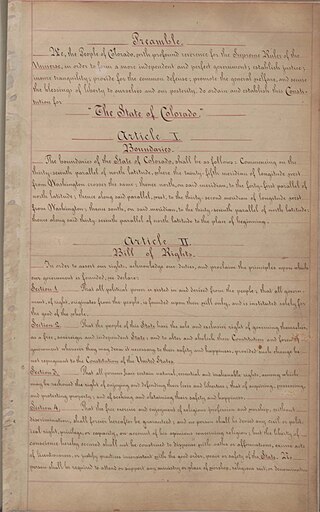
The Constitution of the State of Colorado is the foundation of the laws and government of the U.S. state of Colorado. The Colorado State Constitution was drafted on March 14, 1876; approved by Colorado voters on July 1, 1876; and took effect upon the statehood of Colorado on August 1, 1876. As of 2020, the constitution has been amended at least 166 times. The Constitution of Colorado derives its authority from the sovereignty of the people. As such, the people of Colorado reserved specific powers in governing Colorado directly; in addition to providing for voting for Governor, state legislators, and judges, the people of Colorado have reserved initiative of laws and referendum of laws enacted by the legislature to themselves, provided for recall of office holders, and limit tax increases beyond set amounts without explicit voter approval, and must explicitly approve any change to the constitution, often with a 55% majority. The Colorado state constitution is one of the longest in the United States.
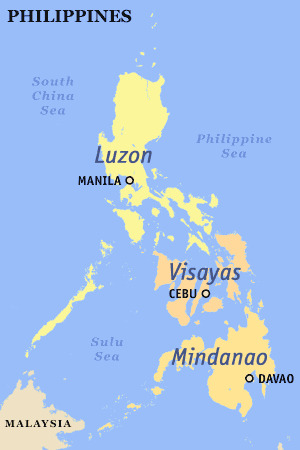
Federalism in the Philippines refers to political movements in the Philippines that are variants of federalism. Federalism has grown in popularity among Filipinos in recent decades, with multiple political candidates successfully campaigning on federalism-based platforms. In 2022, Bongbong Marcos won the Philippine presidential election under the banner of Partido Federal ng Pilipinas.
The Constitution of the Philippines is the supreme law of the Philippines. Its final draft was completed by the Constitutional Commission on October 12, 1986, and ratified by a nationwide plebiscite on February 2, 1987. The Constitution remains unamended to this day.
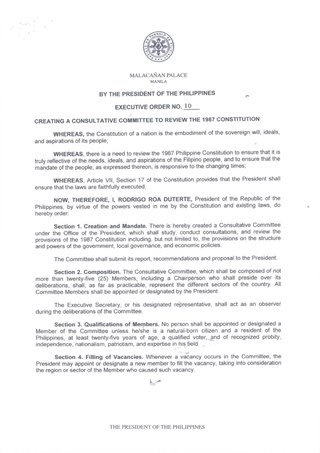
Executive Order No. 10 was signed on December 7, 2016, by Philippine President Rodrigo Duterte which created a consultative committee to review the 1987 Constitution of the Philippines. The move officially set in motion the process for amending the 30-year-old charter and set up a federal system of government in the Philippines aimed at ending the Moro conflict and further opening up of the Philippine economy.

The Constitutional Convention was the constituent body of the Republic of Chile in charge of drafting a new Political Constitution of the Republic after the approval of the national plebiscite held in October 2020. Its creation and regulation were carried out through Law No. 21,200, published on 24 December 2019, which amended the Political Constitution of the Republic to include the process of drafting a new constitution. The body met for the first time on 4 July 2021. Chilean President Sebastian Piñera said, "This Constitutional Convention must, within a period of 9 months, extendable for an additional 3 months, draft and approve a new constitution for Chile, which must be ratified by the citizens through a plebiscite." It ended its functions and declared itself dissolved on 4 July 2022.
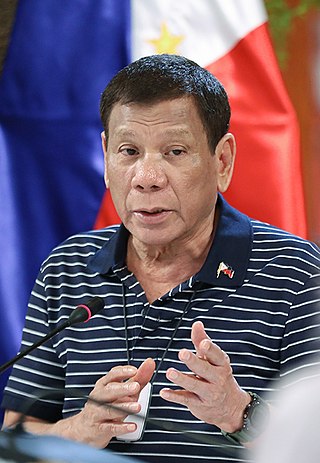
Federalism was one of the main campaign promises of Rodrigo Duterte when he ran for President of the Philippines in 2016. His administration pursued a proposal which would shift the Philippines from being under a unitary form of government to a federal one.
Several attempts to enact constitutional reform have taken place in the Philippines in 2024. This originated with President Bongbong Marcos and his allies' efforts.
References
- ↑ "Voting Separately on Cha-Cha". legacy.senate.gov.ph.